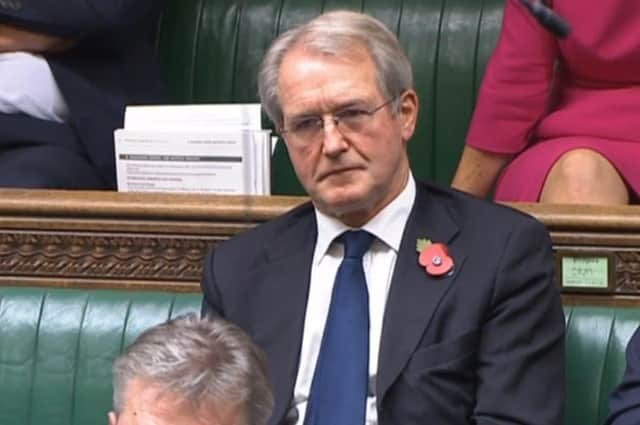Time to face injustices from Yorkshire CCC to Owen Paterson and climate change – David Blunkett


At first glance you might think nothing. Second, you might feel that denunciation, resignation and rush to judgement constitutes a snapshot of the current behaviour in public life.
Advertisement
Hide AdAdvertisement
Hide AdWhat also links all three of these events is that debilitating feeling that “nothing changes” or “we’re all going to hell in a hand cart”. Such pessimism feeds on itself, reinforces the erroneous contention that you can’t trust anyone – and crowds out an optimistic view that we really can make progress.


My old professor of politics, Sir Bernard Crick, in his seminal 1962 work In Defence of Politics, described how he believed that democracy could only work effectively if there is genuine opportunity for participation and, what he called, “active citizenship”.
Advertisement
Hide AdAdvertisement
Hide AdThat politics was, by its very nature, a messy business, and government needed the backing of the people to take on vested interests – including the power of transnational companies, which have since been massively expanded by the likes of Amazon and Facebook.


Take the two-week jamboree in Glasgow, COP26, and the condemnation by Greta Thunberg – the self-appointed guardian of our planet. Speaking to a rally a week ago, she dismissed the progress that had been made, and suggested that what was really happening was the powerful looking after the powerful.
There is some truth in the fact that the chairman of the conference, Alok Sharma, got completely carried away, presumably in the exhilaration of the moment, to pronounce that the representatives of global financial interests sitting in front of him were now the “Swampys” of the modern era. In other words, they were going to stop the damage to the planet and turn their previous behaviour on its head.
Somewhere between Alok Sharma and Greta Thunberg lay the truth. That some progress had genuinely been made, with public and private funding pledged, and although in some respects disappointing, targets had been set which would reduce the carbon being pumped into the atmosphere.
Advertisement
Hide AdAdvertisement
Hide AdWhat might have helped – in addition to an understanding that public engagement is vital to success – is if there’s been genuine debate about the danger of a reaction to the dramatic changes in lifestyle and affordability of basic necessities.
To put it at its bluntest, it is time for the zealots to get real, to appreciate the need to engage with those men and women who will not be able to afford the ever-increasing energy bills, the ripping out of their gas boilers or, for that matter, the complete reliance on electric power. Understanding human nature, the psychology that underpins progressive change, and the very real chance of right-wing demagogues whipping up public fear and resentment, is a prerequisite to success.
That is why, as the dust settles on the departure of Owen Paterson, and the gross mishandling of disciplinary steps by Boris Johnson and the old boys’ network around him, it is vital that decent, moral individuals, committed to public service within the Conservative Party, should get a grip.
Sir John Major’s BBC interview threw down the gauntlet. Does this Government believe that “we are the masters now”, or are they prepared to defend moral and ethical values so vital to trust? The signs have not been good.
Advertisement
Hide AdAdvertisement
Hide AdIn the case of the Paterson affair, we had, not just from him but from senior members of the Government, calls for Kathryn Stone, the Standards Commissioner, to “consider her position”. This, it must be remembered, from the Government that rejected recommendations from Sir Alex Allan, the-then Independent Adviser on Ministers’ Interests, who investigated allegations against Priti Patel, the current Home Secretary. The message has been clear: “Don’t dare to take us on, you will be the loser!”
So how does this link with what I consider to be a tragedy at Yorkshire County Cricket Club? Well, in all cases, we’re talking about human frailty, a sense of what’s right and wrong, and proportionality.
Holding people to account for their actions is necessary but is also messy. Who will hold those to account for their promises leading up to, and during, COP26? How do we hold politicians to account if some of them believe that it’s someone else, and not their own mates, whose feet should be held to the fire?
But, here in Yorkshire, there is one other twist in the important lessons to be learnt from recent events. Namely, you don’t always get the right guy.
Advertisement
Hide AdAdvertisement
Hide AdMy thoughts were with Roger Hutton, the former chair of the board who endeavoured to change the culture and yes, let’s say it again, “old boys” complacent, arrogant and resistant to change.
My message? We must set aside cynicism and encourage all those of goodwill to step up, speak out, and be willing to face down vested interests wherever they are found. “One rule for them and one rule for us” must be replaced by one set of rules by which all of us play and abide.
David Blunkett is a Labour peer and former Home Secretary.
Support The Yorkshire Post and become a subscriber today. Your subscription will help us to continue to bring quality news to the people of Yorkshire. In return, you’ll see fewer ads on site, get free access to our app, receive exclusive members-only offers and access to all premium content and columns. Click here to subscribe.
Comment Guidelines
National World encourages reader discussion on our stories. User feedback, insights and back-and-forth exchanges add a rich layer of context to reporting. Please review our Community Guidelines before commenting.